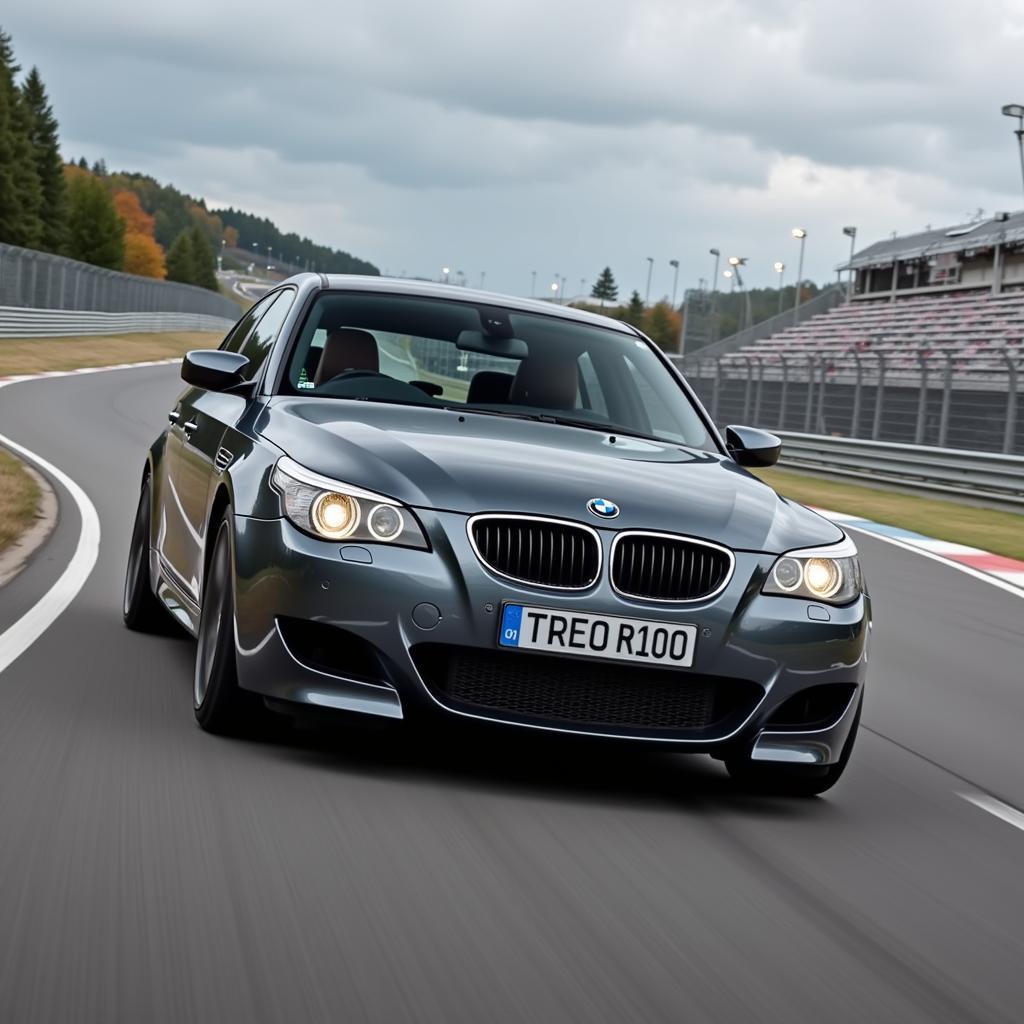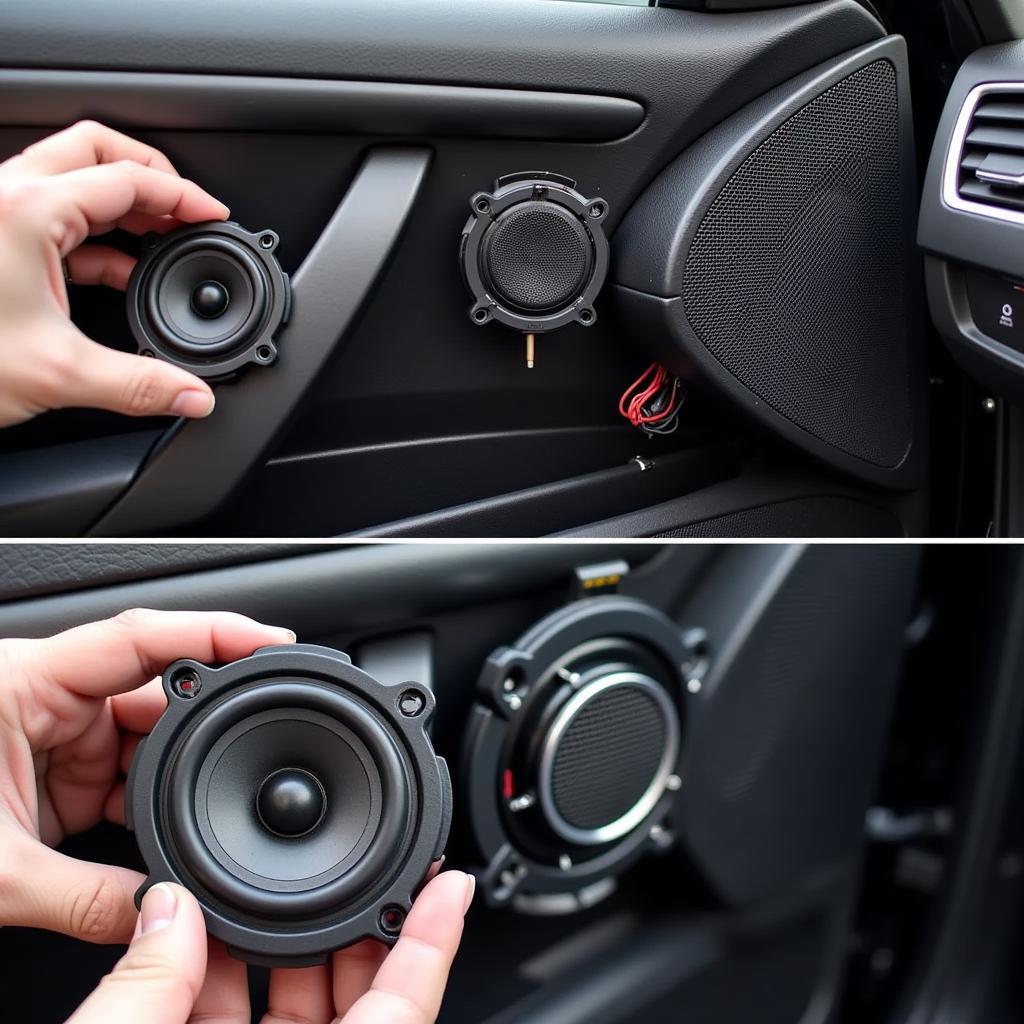The distinct roar of a V10 BMW engine is unmistakable, a symphony of mechanical precision that resonates with car enthusiasts worldwide. This article delves into the captivating world of the v10 bmw sound, exploring its origins, unique characteristics, and the reasons behind its legendary status. We’ll also discuss common issues and solutions related to maintaining this iconic sound.
The Genesis of the V10 BMW Sound
The V10 engine, a marvel of engineering, found its way into two iconic BMW models: the E60 M5 and the E63/E64 M6. These high-performance vehicles, produced between 2005 and 2010, were equipped with the naturally aspirated S85 engine, a 5.0-liter masterpiece capable of producing over 500 horsepower. This engine was a departure from BMW’s traditional inline-6 configuration, marking a significant moment in the company’s history. The bmw e60 v10 sound is truly something special.
Deconstructing the Roar: What Makes the V10 BMW Sound Unique?
The S85 engine’s unique sound is a product of its high-revving nature, reaching a screaming 8,250 RPM redline. This, combined with the ten cylinders firing in a specific sequence, creates a complex and harmonious blend of frequencies. Unlike the deeper rumble of a V8, the v10 bmw sound is higher pitched, more akin to a Formula 1 car. The bmw m3 v10 sound although not directly comparable as the M3 didn’t have a V10, shares a similar high-performance philosophy.
Maintaining the Symphony: Common Issues and Solutions
While the S85 is a robust engine, it’s not without its quirks. Regular maintenance is crucial to preserving the v10 bmw sound and ensuring optimal performance. One common issue is the rod bearings, which can wear prematurely due to the high-revving nature of the engine. Addressing this issue proactively can prevent catastrophic engine failure.
Another potential problem is the throttle actuators, which can become faulty and affect the engine’s responsiveness. Regular inspection and replacement, if necessary, are crucial. Listen carefully to the sound bmw m5 v10 and you can detect any irregularities early on.
Is the V10 BMW Sound Worth the Hype?
Absolutely. The v10 bmw sound is an auditory masterpiece, a testament to BMW’s engineering prowess. It’s a sound that evokes emotion, a sound that signifies power and performance. It is a sound that defines an era. The bmw m5 e60 v10 sound is a classic example.
“The S85’s sound is intoxicating,” says renowned automotive engineer, Dr. Hans Zimmerman. “It’s a high-pitched wail that sends shivers down your spine. It’s a sound that you simply can’t replicate with any other engine configuration.”
The Future of the V10 Sound
With the shift towards turbocharged engines and electrification, the naturally aspirated V10 is becoming increasingly rare. This scarcity only adds to its allure, making the v10 bmw sound even more desirable. The bmw v10 f1 sound is reminiscent of this glorious engine.
 BMW M5 E60 on Track
BMW M5 E60 on Track
Conclusion
The v10 bmw sound is more than just engine noise; it’s a symphony of mechanical precision, a testament to a bygone era of naturally aspirated performance. Preserving this iconic sound requires diligent maintenance and a deep appreciation for its unique characteristics. The V10 BMW engine represents a pinnacle of automotive engineering and its sound will continue to resonate with enthusiasts for generations to come.
FAQ
- What BMW models have a V10 engine? The E60 M5 and E63/E64 M6.
- What is the name of the BMW V10 engine? S85.
- What is the redline of the S85 engine? 8,250 RPM.
- What are some common issues with the S85 engine? Rod bearings and throttle actuators.
- Why is the V10 BMW sound so unique? High-revving nature and ten-cylinder configuration.
“The S85 engine is a masterpiece,” adds automotive historian, Emily Carter. “Its sound is a reminder of a time when performance was prioritized over efficiency. It’s a sound that will never be forgotten.”
Common Scenarios & Questions:
- Scenario: Loss of power and unusual engine noise. Question: Could this be related to the rod bearings?
- Scenario: Rough idle and hesitant acceleration. Question: Could this be a throttle actuator issue?
- Scenario: Want to enhance the V10 sound. Question: What exhaust modifications are recommended?
Further Exploration:
Check out these related articles on our website for more information on specific BMW V10 models: “BMW E60 V10 Sound,” “BMW M5 E60 V10 Sound,” and “Sound BMW M5 V10.”
Need Assistance?
Contact us via WhatsApp: +1 (641) 206-8880, Email: CARDIAGTECH[email protected], or visit us at 276 Reock St, City of Orange, NJ 07050, United States. Our 24/7 customer support team is always ready to help.

